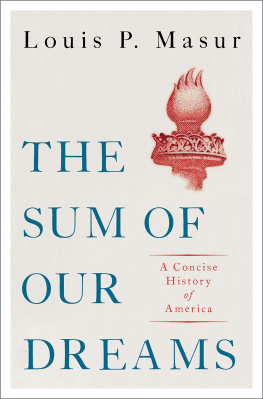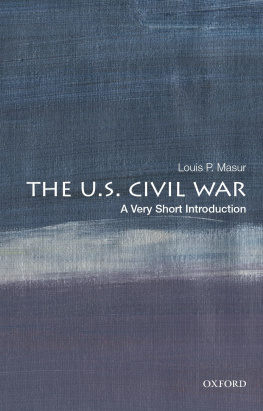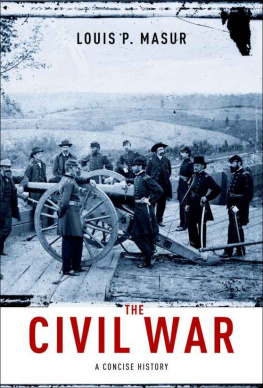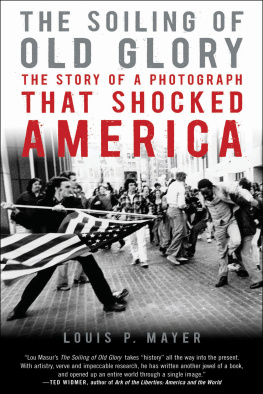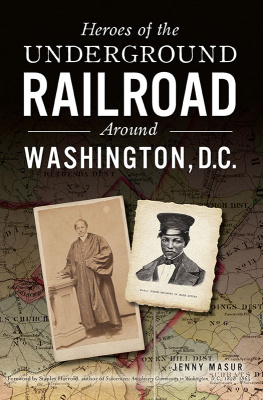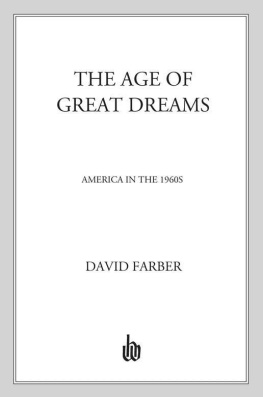The Sum of Our Dreams
Also by Louis P. Masur
Lincolns Last Speech: Wartime Reconstruction and the Crisis of Reunion
Lincolns Hundred Days: The Emancipation Proclamation and the War for the Union
The Civil War: A Concise History
Runaway Dream: Born to Run and Bruce Springsteens American Vision
The Soiling of Old Glory: The Story of a Photograph that Shocked America
Autumn Glory: Baseballs First World Series
1831: Year of Eclipse
Rites of Execution: Capital Punishment and the Transformation of American Culture, 17761865

Oxford University Press is a department of the University of Oxford. It furthers the Universitys objective of excellence in research, scholarship, and education by publishing worldwide. Oxford is a registered trade mark of Oxford University Press in the UK and certain other countries.
Published in the United States of America by Oxford University Press
198 Madison Avenue, New York, NY 10016, United States of America.
Louis P. Masur 2020
All rights reserved. No part of this publication may be reproduced, stored in a retrieval system, or transmitted, in any form or by any means, without the prior permission in writing of Oxford University Press, or as expressly permitted by law, by license, or under terms agreed with the appropriate reproduction rights organization. Inquiries concerning reproduction outside the scope of the above should be sent to the Rights Department, Oxford University Press, at the address above.
You must not circulate this work in any other form and you must impose this same condition on any acquirer.
CIP data is on file at the Library of Congress
ISBN 978-0-19-069257-5
eISBN 978-0-19-069259-9
To Jani
Ben and Rachel
Sophie and Garrett
and my grandson,
Evan Saul Jaffe
The United States themselves are essentially the greatest poem.
Walt Whitman
American history is longer, larger, more various, more beautiful and more terrible than anything anyone has ever said about it.
James Baldwin
Contents
AMERICA WAS MADE FOR DREAMING. It offered escape and it offered opportunity. For some who colonized it, this New Found Land promised religious freedom. For others, it afforded ownership of property and, eventually, slaves. Conquest was part of the enterprise right from the start. Only a few of those who arrived in the early days of settlement saw the indigenous population as having any rights, and warfare marked the first centuries as surely as disease. Over time, a common purpose emerged, sturdy enough to declare independence and create a new form of government. The United States became a land of dreams.
A Frenchman was among the first to examine the conditions that allowed Americans to forge a collective identity. J. Hector St. John de Crvecoeur, a soldier and adventurer, arrived in New York in 1759 and farmed a parcel of land in Orange County, New York, near Goshen. His book Letters from an American Farmer (1782) made him a minor celebrity. Crvecoeur asked a question that has resonated across time: What, then, is the American, this new man? His answer stressed equality and the possibility of enrichment. The rich and the poor are not so far removed from each other as they are in Europe, he declared. The immigrant looks around and sees many a prosperous person who but a few years before was as poor as himself. In America, anyone could succeed.
In time, these elements formed part of what we now refer to as the American Dream. The phrase is credited to James Truslow Adams, a banker turned historian with no relation to the presidential
Equal opportunityfor all our citizenslies at the core of the American Dream, and it is linked to other fundamental principles such as freedom and democracy. These words have also been fraught and contested across generations. Americans have invoked them time and again during wrangles over domestic reforms and foreign involvement and, once, in the Civil War, on actual battlefields. Celebrated for their individualism (a word coined by another Frenchman, Alexis de Tocqueville), Americans have continuously debated the place of government in their lives. Whether invoking Abraham Lincolns Government of the People or Ronald Reagans Government Is the Problem, citizens have fought over what it is they want their government to do, and not do, over how dreams can best be achieved and who should achieve them.
The struggles over these American ideals ground this history of the United States. An earlier example of the genre, Allan Nevins and Henry Steele Commagers A Pocket History of the United States, was first published during World War II. Revised and expanded editions in the decades that followed sold more than two million copies. One reader in particular illustrates the potential impact of such a work. On tour in Europe in 1981, Bruce Springsteen, who had dropped out of community college to pursue his rock n roll dream, announced from a stage in Rotterdam that in reading A Pocket History of the United States I found out where I came from and how I ended up where I was and how easy it is to be a victim of things you dont even know exist.
Thirty years later, Springsteen was promoting an album featuring a song called Land of Hope and Dreams. His lifes work, he said, had been about judging the distance between American reality and the American dream.
Judging that distance also informs this book. To do so means narrating the central developments and dramas of American history. Each chapter covers a distinct period of time and is divided into five sections that address some of the key events of the times. For example, the era of the 1920s1940s is separated into sections on Prohibition, the Depression, the Dust Bowl, the New Deal, and World War II. Treating any of these topics in fewer than ten pages means streamlining them. My objective is not to overwhelm readers but to engage them. My goal is to provide a foundation of knowledge on which readers can base further exploration of American history. This book is about the sum of our dreams, not their conclusion.
All histories have a point of view and readers would be right to be curious about mine. I have been teaching American history for more than three decades and thinking about writing a one-volume narrative of the United Statesand about how to address all of it, the reprehensible and the redemptivefor nearly as long. Some readers may dislike my emphasis on the underside of American historyracism, violence, and corruption. Other readers may wince at my unabashed admiration for the American experimentfreedom, democracy, and opportunity. I hope all can agree that Americans need to learn more about their nations history.
The title of this book comes from a speech Barack Obama delivered in 2007 in Bettendorf, Iowa. A candidate for president, Obama emphasized what united Americans, not what divided them. Americans, he said, share a faith in simple dreams. A job with wages that can support a family. Health care that we can count on and afford. A retirement that is dignified and secure. Education and opportunity for our kids. Common hopes. American dreams. They inspired his grandparents, and his father-in-law, and his mother. Visions of a better life for ourselves, and even better lives for our children, went to the heart of them. As he concluded his speech, he rose to his theme: every American has the right to pursue their dreams.... America is the sum of our dreams.

